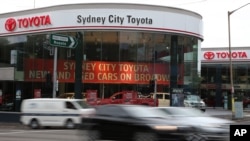SYDNEY —
Academics and trade unions are warning that Toyota’s decision to stop car manufacturing in Australia could push parts of the country into recession. The Japanese automaker said this week it will close its assembly lines in Australia by the end of 2017.
Toyota’s announcement is the latest incident in what has been a terrible year for Australia’s once-flourishing car making industry.
Last May, Ford said it would stop manufacturing in Australia, and General Motors announced late last year that it, too, would be closing down.
Now, Japanese automaker Toyota is the latest to shut down production in Australia. Toyota said its move to end production in the southern Australian state of Victoria was “heartbreaking.” Senior managers blamed high labor costs and a strong Australian dollar, which has made Toyota cars sold overseas more expensive.
The Australian government has also been unwilling to offer subsidies to offset higher costs for car manufacturers.
More than two thousand Toyota workers will lose their jobs, but trade unions insist the departure of the Japanese motoring giant could leave 50,000 Australians out of work, wipe $19 billion from the national economy and tip the traditional manufacturing states of Victoria and South Australia into recession.
It marks a striking turnaround for an industry that produced about 200,000 vehicles annually for the domestic and export markets and spent more than $540 million per year on research and development.
Associate Professor John Spoehr, executive director of the Australian Workplace, Innovation and Social Research Center at the University of Adelaide, said carmakers have found it impossible to operate in Australia.
“We now have one of the most competitive auto markets in the world with at least sixty different models here. In addition, we have had declining demand internationally as a consequence of the global financial crisis, and the rise of low-cost manufacturing in India, China and Thailand, and, more recently, a lot of uncertainty about the level of government assistance that the new federal government is willing to provide to the industry and that has only added to problem that we are experiencing,” said Spoehr.
The collapse of Australia’s car industry has dominated the first parliamentary session of the year. Prime Minister Tony Abbott's political opponents accuse the conservative leader of not doing enough to convince Toyota to not close down local operations.
However, Abbott has argued that after just five months in office, he cannot be blamed for the collapse of an industry that has been in long-term decline.
Australia's automotive sector has traditionally received billions of dollars in support from the government, but a national productivity commission recently recommended that financial backing should stop and car companies should cut costs instead.
Toyota’s announcement is the latest incident in what has been a terrible year for Australia’s once-flourishing car making industry.
Last May, Ford said it would stop manufacturing in Australia, and General Motors announced late last year that it, too, would be closing down.
Now, Japanese automaker Toyota is the latest to shut down production in Australia. Toyota said its move to end production in the southern Australian state of Victoria was “heartbreaking.” Senior managers blamed high labor costs and a strong Australian dollar, which has made Toyota cars sold overseas more expensive.
The Australian government has also been unwilling to offer subsidies to offset higher costs for car manufacturers.
More than two thousand Toyota workers will lose their jobs, but trade unions insist the departure of the Japanese motoring giant could leave 50,000 Australians out of work, wipe $19 billion from the national economy and tip the traditional manufacturing states of Victoria and South Australia into recession.
It marks a striking turnaround for an industry that produced about 200,000 vehicles annually for the domestic and export markets and spent more than $540 million per year on research and development.
Associate Professor John Spoehr, executive director of the Australian Workplace, Innovation and Social Research Center at the University of Adelaide, said carmakers have found it impossible to operate in Australia.
“We now have one of the most competitive auto markets in the world with at least sixty different models here. In addition, we have had declining demand internationally as a consequence of the global financial crisis, and the rise of low-cost manufacturing in India, China and Thailand, and, more recently, a lot of uncertainty about the level of government assistance that the new federal government is willing to provide to the industry and that has only added to problem that we are experiencing,” said Spoehr.
The collapse of Australia’s car industry has dominated the first parliamentary session of the year. Prime Minister Tony Abbott's political opponents accuse the conservative leader of not doing enough to convince Toyota to not close down local operations.
However, Abbott has argued that after just five months in office, he cannot be blamed for the collapse of an industry that has been in long-term decline.
Australia's automotive sector has traditionally received billions of dollars in support from the government, but a national productivity commission recently recommended that financial backing should stop and car companies should cut costs instead.








